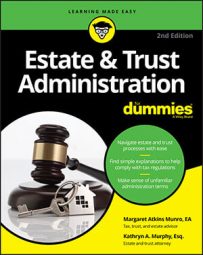The grantor of the trust has indeed set the stage for his or her wishes to be played out under the trust instrument. As trustee, identifying the players is one of your important first steps because you need to know who the beneficiaries and remaindermen are (you presumably already know the grantor if he or she appointed you as trustee) and if there are any co-trustees acting with you.
Here is a typical “cast”:
Grantor: Sometimes called the settlor, this person creates the trust.
Trustee: The person or corporation charged with safeguarding and managing the assets of the trust and making distributions to beneficiaries in accordance with the grantor’s stated wishes in the trust instrument. The trustee can be either independent or non-independent (usually a family member), and trusts may have either type of trustee or both.
Independent trustee: An independent (or professional) trustee is one the IRS considers independent of the grantor and the beneficiaries for estate tax purposes. That way, the principal of the trust isn’t included in the beneficiary’s taxable estate upon his or her own death. The independent trustee may be either an individual independent trustee or a corporate independent trustee.
The individual independent trustee is (ideally) an expert in trust administration, such as an attorney, accountant, or enrolled agent. The corporate independent trustee is a bank or trust company whom the grantor appoints as trustee; this entity always qualifies as an independent trustee.
Family or non-independent trustee: A family or non-independent trustee is one who is the grantor or a beneficiary (or is related in such a way that he or she wouldn’t be considered independent for estate tax purposes). Grantors frequently use family trustees with independent trustees so that a family member or another non-independent source can give input on trust matters that don’t affect the trust’s tax status.
As long as the family trustee doesn’t have the power to make unrestricted distributions to himself or herself or to a dependent, he or she may participate in all other issues relating to managing the trust.
Beneficiary(ies): Beneficiaries are those people or entities who/that have an interest in the trust, whether now (a present interest) or in the future (a future interest). An interest as a beneficiary can also be contingent or vested. For instance, a person who could only become a beneficiary if the current beneficiary dies during the first person’s lifetime is a contingent beneficiary.
Remaindermen: Remaindermen are those people or entities who will receive the trust property after an interest in it has expired. If, for instance, Uncle George leaves his property in trust for the lifetime of his wife, Aunt Rose, for her benefit, with the property to go outright to his nieces and nephews upon Aunt Rose’s death, the nieces and nephews are the remaindermen.
You are balancing the rights of the current and future beneficiaries and the remaindermen when you make your judgments as to distributions of principal and trust investments. If principal distributions are discretionary, assets left in the trust to accumulate benefit later beneficiaries and remaindermen, and your decisions as to what mix of income earning and growth investments to hold in the trust affects both the income beneficiary and the remaindermen.

